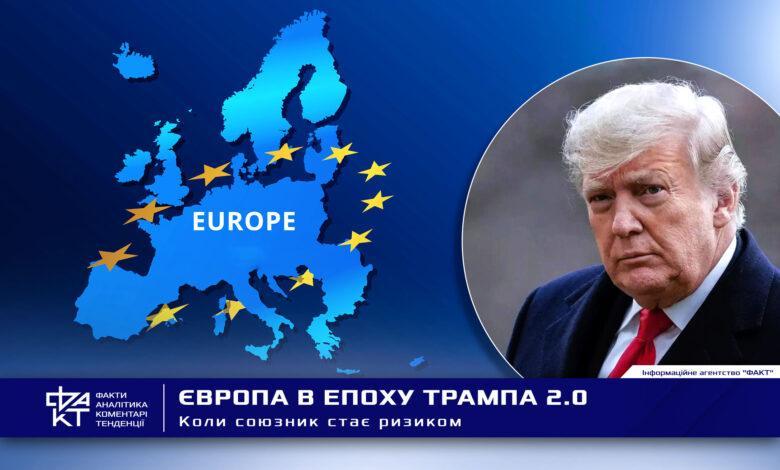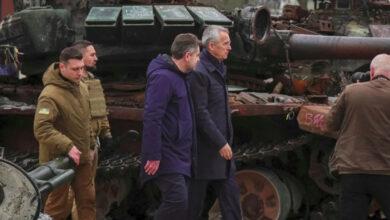From ‘America First’ to ‘Surviving on Your Own’: How Europe Changed Under Trump 2.0

A few months ago, European leaders tried to find logic in Donald Trump’s rhetoric, if only in the style of “America above all.” Today, they are looking for a plan B. Three months into Trump’s second term changed the diplomatic maps of the world: for the first time in a decade, US allies began to ask questions not only about how to cooperate, but whether it should at all.
Politico publication beats up the results of the first three months of the second presidential term of Donald Trump. The article says that Trump continues to implement his line in the international arena, trying to impose his will on allies and declaring that they “have no trump card”. However, Politico notes, in the capitals of European countries and not only, discussions are boiling: are their hands really as weak as Washington claims, and what cards can still be played in the great geopolitical game.
Europe is looking for a way without Washington
The publication Politico analyzes how the world reacts to the new foreign policy of Donald Trump, which during the first three months of his second presidential term turned into a real test for transatlantic unity. The governments of European countries and Canada today are forced to consider not only symbolic gestures, but also steps capable of fundamentally changing the architecture of the Western partnership, which has been built for almost a century.
The spectrum of these possible solutions includes the search for alternatives to American arms manufacturers, the introduction of mirror tariffs, the limitation of intellectual property of American companies and the reduction of dependence on the technological giants of the United States. About these plans Political learned from the words of more than two dozen government officials from Europe and Canada, many of whom agreed to speak only on condition of anonymity — discussions are being held at the highest level, but no one officially confirms them.
“The mindset has changed. The time for temptation has passed — the strategy begins“, the publication quotes one of the EU diplomats. According to him, now Europe must defend itself on its own and look for a way that does not depend on Washington.
And indeed, in less than three months, Trump has managed to shock the world — his foreign policy, which increasingly resembles a game on the field of imperial ambitions, economic nationalism and cynical pragmatism, causes more and more alarm. From loud statements about the possibility of annexing Canada and Greenland to the readiness to end the war in Ukraine almost on Russia’s terms, these messages, along with Vice President J.D. Vance’s caustic attacks on Europe, which he called “scumbags,” left allies with no illusions. As The Guardian wrote, Vance in March 2025 at a summit in Bratislava stated: “America must stop feeding those who don’t even know how to fight.”
And the culmination was an economic blow: the introduction of massive tariffs against almost all US trading partners. And although the justification for this step caused surprise among leading economists, it was he who finally convinced the allies that the time to hope for a new-old US president had passed. In his extensive material Political tells how European leaders — from London to Warsaw, from Helsinki to Rome — are balancing efforts to maintain productive relations with the United States and the need to protect themselves from the unpredictable actions of Donald Trump. It is not only about diplomatic restraint, but also about strategic “insurance” — cautious steps that could become the first cracks in the dam of transatlantic unity. And if that dam does break, the world could see an avalanche of mutual sanctions, political revisions, and the ultimate rupture of the alliance that has bound America to Europe for eight decades.
The White House is trying to downplay the scale of a possible split. They insist that Trump is acting for the security of Europe, in particular in the matter of ending the war in Ukraine, although without special coordination with NATO allies. According to the administration, its initiatives, including the restoration of safe shipping in the Red Sea, will also benefit European markets.
“The president is leading efforts to peacefully resolve Europe’s largest conflict since World War II, and is working to restore international trade routes that will benefit the European economy” said Brian Hughes, a spokesman for the US National Security Council. According to him, the US will continue to support European allies through arms sales, calls for increased defense budgets and pressure on common enemies such as the Houthis.
However, internal discussions in Trump’s team suggest otherwise. In the Signal messages, which appeared during the American attacks on the Houthis, senior officials spoke disparagingly of Europe as “a briber”. Vice President JD Vance even admitted that he “hated” having to bail her out all the time. According to Minna Olander, an expert from the European Policy Center, the Trump administration believes that Europe is a dying continent without a future, and that Russia is the real power.
“Perhaps, very soon, they will be convinced that everything is just the opposite“, she adds.
Poland as a litmus test: even the most loyal partners of the USA are beginning to look around for alternatives
Poland — one of the staunchest allies of the United States in Europe and the largest importer of American weapons in the world — is beginning to review its cooperation with Washington. Posters with silhouettes of Putin and Trump appear on the streets of Warsaw, an alarming sign of how the atmosphere in relations between European capitals and the White House has changed just weeks into the new administration.
With his ultimate calls to increase defense spending — not to 2% of GDP, as required by the NATO standard, but up to 5% — Trump wanted to force Europeans to invest in security. But instead of strengthening cooperation with American defense companies, allies are beginning to look for alternatives. Poland, which currently spends a record 4.7% of GDP on defense and plans to allocate $47.1 billion in 2025, is rethinking further purchases from the United States.
“Confidence in the US has been seriously undermined“, Pawel Kowal, Poland’s special representative for Ukraine issues, admits. He emphasizes that, despite the fact that already concluded contracts with American manufacturers will be fulfilled, there is no talk of new agreements at the moment. “We have to diversify our weapons purchases – buy more in Europe or develop our own production.”
Cezary Tomczyk, Poland’s deputy defense minister, acknowledges that strong ties with the U.S. remain strategically important, but he also warns Washington that pushing back Warsaw will not benefit the United States itself. “The US has specific interests in Poland. And if America isolates Poland, it will not be good for America itself.”
Until recently, European leaders hoped that they could keep Trump in NATO by promising to spend more on defense and direct a significant portion of funds to American contracts. Today, this strategy is bursting at the seams. And the movement goes in the opposite direction.
“Europe no longer wants to buy without trust”
Europe is indeed increasing its defense budgets, but it is increasingly choosing to spend that money at home rather than in the US. The reason is not only the desire to strengthen its own industry, but also the political distrust that has grown since Donald Trump unexpectedly ended military aid to Ukraine and the sharing of intelligence data in March.
“If you buy something, you should be sure that you will be able to use it“, said Estonian Foreign Minister Margus Tsahkna, stressing that trust is a key component of security agreements.
Countries that previously willingly purchased American F-35 fighter jets, Patriot complexes and other equipment are now beginning to have doubts. Canada, Portugal, Denmark and even Germany have expressed concern: What would happen if, in the event of a political conflict, Trump blocked access to software or spare parts, rendering weapons unusable?
“We can no longer simply appease Trump by shopping, — says Peter Bayer, member of the Bundestag from the CDU, — how it worked during his first term. It doesn’t work anymore“.
Although German Defense Minister Boris Pistorius said that Berlin will not terminate existing contracts for the F-35, he admitted that this is rather a forced decision, because there are currently few alternatives for modernizing the fleet. And even if doubts about the “kill switch” for the F-35 have no technical basis, relying on the United States in the future is “unwise,” Bayer said.
Despite the fact that Europe has built its security on American weapons for decades, and it is not easy to abruptly abandon this dependence, an alternative is already forming, and it is quite convincing. Even the famous American Patriot systems no longer seem irreplaceable. On their heels is a European competitor — SAMP/T, created by France and Italy. It is being modernized, and soon it will be able to reach the same range as the “Patriot”.
But the main thing is trust. SAMP/T received its baptism of fire in Ukraine, where the effectiveness of the system is not theorized in reports, but tested in real battles. And this practice is convincing: Europe has the resources to be not only a consumer of security, but also a full-fledged player in the defense technology market.
Thus, the concept of a political “kill switch” turns from an abstract threat into a real decision-making factor. Europe realizes that any purchase in the USA is now accompanied not only by an invoice, but also by the question of whether this purchase will become a hostage to another presidential statement or indignation in the Signal group of the White House.
Europe is ready to spend billions on defense, but less and less ready to invest these funds in the American military-industrial complex, if there is no political certainty that these weapons will not become a lever of pressure.





